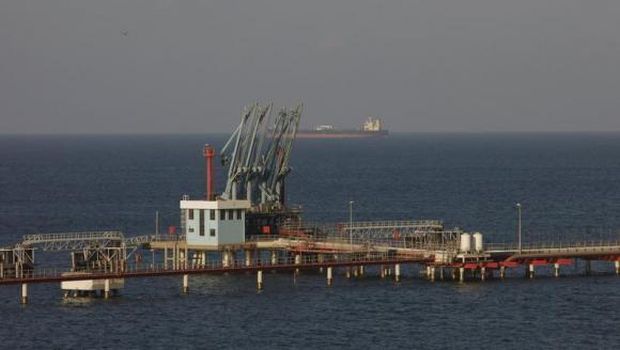
A view of pipelines and a loading berth of Hariga oil port in the city of Tobruk, approximately 932 miles (1,500 km) east of Tripoli, on August 20, 2013. (Reuters/Ismail Zitouny)
Cairo, Asharq Al-Awsat—Libya is restarting the process of exporting oil after an eight-month standoff with rebels who blockaded a number of the country’s most prominent ports ended last week following negotiations between the rebels and the Tripoli government.
A tanker, the Aegean Dignity, arrived at the Hariga port in the country’s eastern region on Tuesday, according to a statement by Salah Al-Monghi, the head of the Management Committee at the Arabian Gulf Oil Company, a subsidiary of Libya’s state-owned National Oil Corporation (NOC). Monghi said the tanker would load some 1 million barrels of crude oil destined for Italy.
An NOC official speaking to Reuters said the vessel began loading the oil on Wednesday.
Speaking to Asharq Al-Awsat, NOC spokesperson Mohamed Al-Harari said a further “800,000 barrels of crude will be ready for export from the Hariga Port within the next 10 days,” adding that he expected the government to step up activity at the port in an attempt to make up the losses incurred since the closure.
This follows an agreement on April 6 between the Tripoli government and rebels in the country’s eastern region to relinquish control of a number of Libya’s most important ports—including its largest, Sidra—following a blockade that has lasted eight months, completely crippling the country’s oil export activity.
Libya’s oil production fell from 1.4 million barrels per day (bpd) before the rebel takeover last fall to 150,000 bpd currently, according to official government figures. The country’s oil ministry said oil export receipts fell from 12 billion Libyan dinars (9.7 billion US dollars) to 3 billion dinars (2.4 billion dollars) year-on-year during the first quarter of 2014.
As part of the agreement the rebels immediately opened the Hariga and Zuetina ports, with the Ras Lanuf and Sidra ports due to be open in two to four weeks following further talks with the government.
Harari said: “Talks must resume [with the rebels] to open the remaining ports. We have suffered great losses from this [crisis], but we will be able to make up these losses once production and export levels are back to normal.”
The Zuetina and Harega ports accounted for around 200,000 bpd of the 1.4 million bpd of exports before the crisis, with the larger ports such as Sidra and Ras Lanuf contributing around 500,000 bpd each.
A diplomat from an Arab country who requested anonymity told Asharq Al-Awsat that in any country where the economy relies almost entirely on oil, “a mere 100 untrained armed people can take control of ports and oil fields and, more generally, impact the entire economy.”
The head of Libya’s Tripoli-based parliament, the General National Congress, said recently the country had sustained some 18 billion dollars in losses since the crisis began.
While the majority of the stoppages in the west have been caused by civil protests over pay, working conditions and minority rights, the more well-known of the rebels are secessionists from the country’s eastern region of Cyrenaica. They are led by Ibrahim Jadhran, a former anti-Gaddafi fighter and head of a guard corps set up to protect state-run oil facilities, and are demanding greater control of oil production and a greater share of exports from the region, as well as the establishment of a committee to oversee the exports.
Jadhran’s movement is demanding greater autonomy for Cyrenaica, accusing the Tripoli government of neglecting the region.
Tensions between the rebels and the government came to a head last month when the rebels loaded oil onto a tanker off Sidra without Tripoli’s approval in a bid to export the oil themselves.
Meanwhile, on Tuesday the NOC announced that the Arabian Gulf Oil Company had discovered two new oil and gas fields near Libya’s Sirte Basin, extracting around 1,900 barrels of oil in the process.
